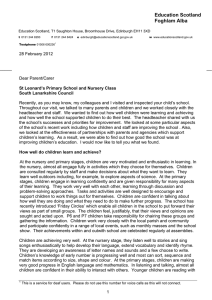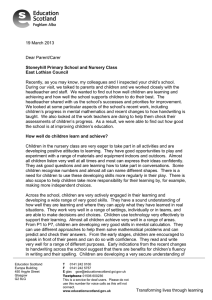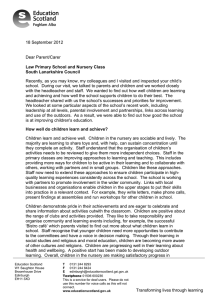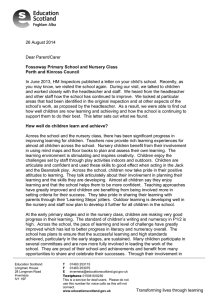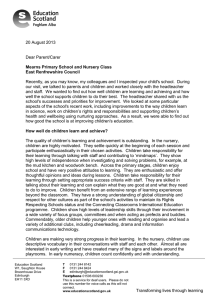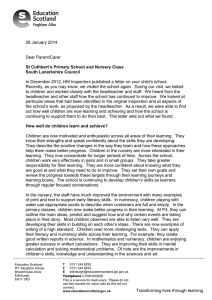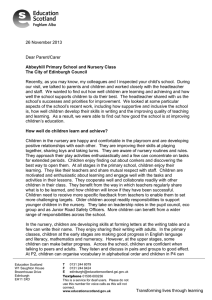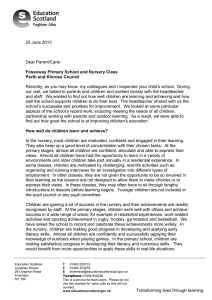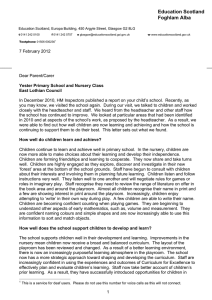11 February 2014 Dear Parent/Carer ’s school. During
advertisement
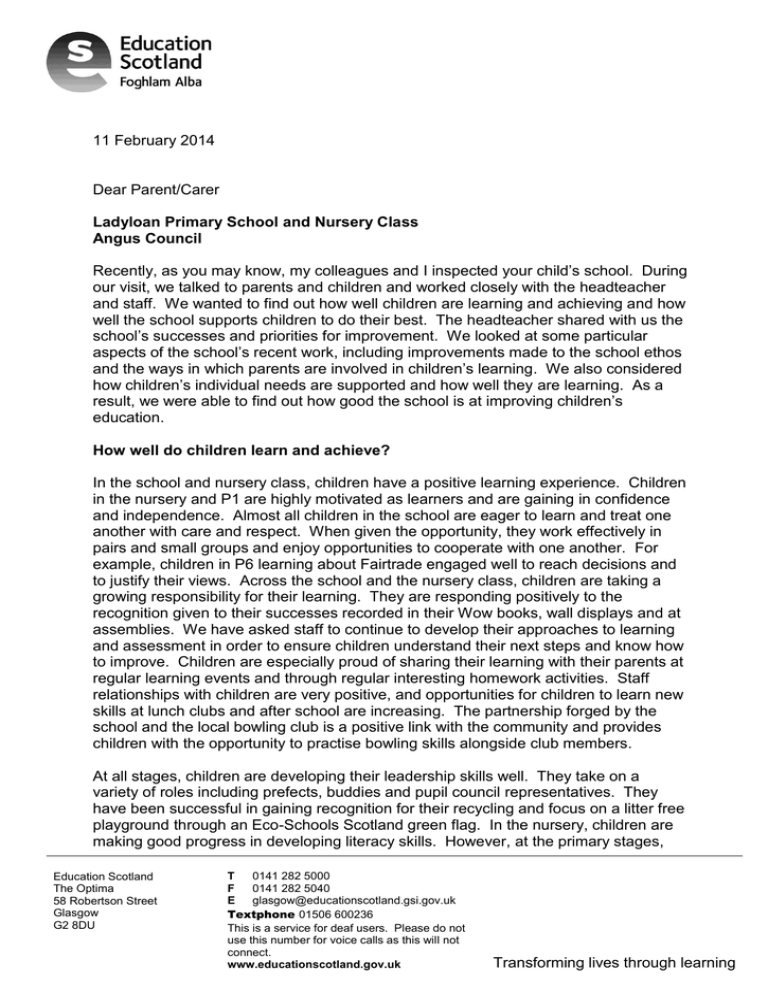
11 February 2014 Dear Parent/Carer Ladyloan Primary School and Nursery Class Angus Council Recently, as you may know, my colleagues and I inspected your child’s school. During our visit, we talked to parents and children and worked closely with the headteacher and staff. We wanted to find out how well children are learning and achieving and how well the school supports children to do their best. The headteacher shared with us the school’s successes and priorities for improvement. We looked at some particular aspects of the school’s recent work, including improvements made to the school ethos and the ways in which parents are involved in children’s learning. We also considered how children’s individual needs are supported and how well they are learning. As a result, we were able to find out how good the school is at improving children’s education. How well do children learn and achieve? In the school and nursery class, children have a positive learning experience. Children in the nursery and P1 are highly motivated as learners and are gaining in confidence and independence. Almost all children in the school are eager to learn and treat one another with care and respect. When given the opportunity, they work effectively in pairs and small groups and enjoy opportunities to cooperate with one another. For example, children in P6 learning about Fairtrade engaged well to reach decisions and to justify their views. Across the school and the nursery class, children are taking a growing responsibility for their learning. They are responding positively to the recognition given to their successes recorded in their Wow books, wall displays and at assemblies. We have asked staff to continue to develop their approaches to learning and assessment in order to ensure children understand their next steps and know how to improve. Children are especially proud of sharing their learning with their parents at regular learning events and through regular interesting homework activities. Staff relationships with children are very positive, and opportunities for children to learn new skills at lunch clubs and after school are increasing. The partnership forged by the school and the local bowling club is a positive link with the community and provides children with the opportunity to practise bowling skills alongside club members. At all stages, children are developing their leadership skills well. They take on a variety of roles including prefects, buddies and pupil council representatives. They have been successful in gaining recognition for their recycling and focus on a litter free playground through an Eco-Schools Scotland green flag. In the nursery, children are making good progress in developing literacy skills. However, at the primary stages, Education Scotland The Optima 58 Robertson Street Glasgow G2 8DU T 0141 282 5000 F 0141 282 5040 E glasgow@educationscotland.gsi.gov.uk Textphone 01506 600236 This is a service for deaf users. Please do not use this number for voice calls as this will not connect. www.educationscotland.gov.uk Transforming lives through learning children’s literacy skills are not sufficiently well developed. Most children listen attentively and talk confidently about their learning. Children’s writing is of a satisfactory standard. Children in the nursery and P1 are making a strong start to early independent writing skills. Good support is provided to children who have additional support needs including those who have English as an additional language. The school recognises that children across the school are capable of progressing through Curriculum for Excellence reading levels at a quicker pace. In the nursery, children are making very good progress in numeracy. They are confident when counting, recognising the days of the week and naming two-dimensional shapes. By P7, children can plot coordinate points accurately and are confident about percentages and multiplication of numbers. However, across the school, children’s attainment in mathematics should be improved and children expected to achieve more. Children in the nursery class and school have a very strong knowledge and understanding of health and wellbeing and the importance of healthy lifestyles. At P3/4, children were using information and communications technology very effectively to support their learning about Victorian schools. Children experience very good opportunities for physical education including learning outdoors. How well does the school support children to develop and learn? Across the school and nursery class, staff provide a supportive and inclusive ethos that encourages children to value their achievements and ensures a positive climate for children to learn. Those children who attend the additional support unit are included very well in the mainstream classes for most of their day. This is of mutual benefit to all children at Ladyloan Primary School. In most instances, children’s learning needs are well met. This is most evident when children are supported through activities that are appropriately challenging to meet the needs of individuals. We have asked the school to ensure learning is suitably challenging for all learners, including those who are progressing well, and that the pace of learning is increased across all stages. The headteacher works very closely with staff, parents and partners to identify learning needs early and to ensure appropriate support is accessed when required. Staff who work with children who have additional support needs work effectively as a team and support children and their families very well. Staff provide children with interesting opportunities to develop their skills in health and wellbeing. They are developing Curriculum for Excellence programmes for all areas of the curriculum and are focusing on improving literacy and numeracy to ensure children make better progress. In all classes, children have a broad and balanced experience across the curriculum. Staff are working hard to provide interesting themes to motivate children. For example, children in P7 are developing creative thinking skills through the topic of Treasure Island. Staff should continue to develop the curriculum as planned and ensure children’s skills are developed systematically and progressively. These plans should also include more opportunities for enterprise education and outdoor learning. The school has very effective approaches to working in partnership with other agencies to support children. These approaches work particularly well in the nursery class and when children move into P1. The headteacher and staff have strong links with Arbroath High School ensuring children build on their learning when they enter S1 and are continuing to refine and improve this transition. 2 How well does the school improve the quality of its work? The headteacher has been in post for one year. In that time, she has gained the respect of staff, pupils and parents. She is an effective leader who knows the strengths and development needs of the school well. She has high expectations and has successfully improved children’s behaviour, staff morale and created a positive ethos for all. She has fostered a climate of trust where staff are confident about their roles and responsibilities. She has encouraged staff to share leadership and has provided the recently-appointed depute and principal teacher with opportunities to develop strengths in their respective remits. They work effectively as a senior management team and are now ready to share their vision for the school more fully. Together they have gathered a wide range of information through consultation with staff, children and parents. Parents are very happy with the improvements that have resulted, for example, in the formation of the homework policy. The Parent Council is very supportive of the school’s work and regularly supports successful fundraising events. Staff morale at the school has improved significantly. Staff are fully committed to developing the curriculum and improving learning and teaching. The headteacher, depute headteacher and principal teacher are well placed to lead the school and to raise standards yet further. This inspection found the following key strengths. The effective leadership of the headteacher and her positive impact on relationships with pupils, staff and parents. Inclusion of children who have additional support needs. Children who are eager to learn and to contribute to the inclusive ethos of the school. The high-quality pastoral care provided by staff. Positive learning experiences in the nursery and at P1. We discussed with staff and the education authority how they might continue to improve the school and nursery class. This is what we agreed with them. Continue to implement the school improvement plan to bring about improvement in the curriculum and to raise attainment. What happens at the end of the inspection? We are satisfied with the overall quality of provision. We are confident that the school’s self-evaluation processes are leading to improvements. As a result, we will make no further visits in connection with this inspection. As part of its arrangements for reporting to parents on the quality of education, Angus Council will inform parents about the school’s progress. Susan Gow HM Inspector 3 Additional inspection evidence, such as details of the quality indicator evaluations, for your school can be found on the Education Scotland website at http://www.educationscotland.gov.uk/inspectionandreview/reports/school/primsec/Lady loanPrimarySchoolAngus.asp If you would like to receive this letter in a different format, for example, in a translation please contact the administration team on the above telephone number. If you want to give us feedback or make a complaint about our work, please contact us by telephone on 0141 282 5000, or e-mail: complaints@educationscotland.gsi.gov.uk or write to us addressing your letter to the Complaints Manager, Denholm House, Almondvale Business Park, Livingston EH54 6GA. 4
